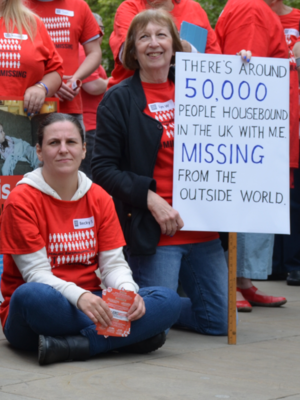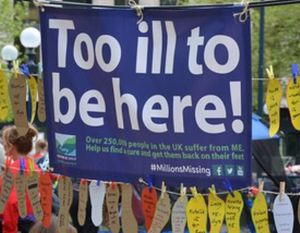ME activists and advocates
From MEpedia, a crowd-sourced encyclopedia of ME and CFS science and history
(Redirected from ME activists)

Activists and advocates for patients with Myalgic Encephalomyelitis (ME) or Chronic Fatigue Syndrome include patients, their friends and family, researchers and health professionals, politicans, and members of the general public.
A number of activists are citizen scientists who reviewed or re-analysed existing research, and in some cases have conducted their own research.
Patient advocates and activists
Notable patient activists with ME or CFS.
- Jen Brea, director of Unrest, co-founder of the #MEAction Network
- Robin Brown, retired NHS doctor and founder of Doctors with M.E., author, and creator of a major UK treatment petition, also involved in training doctors
- Robert Courtney (deceased), citizen scientist and who proved that the Cochrane review of exercise for CFS failed to meet Cochrane's own standards
- Keith Geraghty, psychologist, researcher and activist who has investigated if ME charities are militant
- Ellen Goudsmit, psychologist and former patron of several ME charities
- Tanya Harrison, BRAME charity founder, resigned from the 2007 NICE guidelines group because she could not support the controversial guidelines they developed
- Cort Johnson, founder of both Phoenix Rising and Health Rising, has won several awards for advocacy, blogs about science and research
- Tom Kindlon, citizen scientist from Ireland and extremely well known ME advocate
- Alem Matthees, citizen scientist from Australia who fought and won a tribunal for the release of the PACE trial data despite being too ill to attend. He is now very severely ill.
- Courtney Miller, member of the Board of Directors and an online writer at Simmaron Research
- Nina Muirhead, NHS surgeon who has done a number of media interviews and is involved in training doctors and Doctors with M.E.
- Graham McPhee (deceased), former teacher who campaigned against graded exercise therapy and for the UK's NICE guidelines to be reviewed, but died shortly before the new guidelines were published
- John Peters, PACE trial critic from Wales and originator of a number of Freedom of Information Act requests, friend of Ben Lake MP
- Ryan Prior, journalist, co-director of the documentary Forgotten Plague, founder of The Blue Ribbon Foundation and associate producer at CNN[1]
- Julie Rehmeyer, US math/science journalist, PACE trial critic and author of memoir about living with ME/CFS
- Rivka Solomon, writer and organizer in the U.S.; she was a lead organizer in some of the largest in-person events ever held for ME
- Frank N. M. Twisk, ME-de-patiënten Foundation, an outspoken Dutch activist with over a dozen letters or citizen science articles published, Twisk advocates for ME but not chronic fatigue syndrome
- Mark Vink, former doctor (general practice) with severe ME, patient researcher, former marathon runner and Dutch national hockey captain
- Naomi Whittingham, severely ill since childhood, Naomi featured in Voices from the Shadows and has a number of media interviews
Psychologists and psychiatrists
- Keith Geraghty, psychologist with ME
- Brian Hughes, psychologist
- Ellen Goudsmit, psychologist with ME and author of the London criteria for ME
- Janet Dafoe, child psychologist, Vice President of Phoenix Rising, protests at Millions Missing everyday and full time carer for her very severely ill son Whitney Dafoe
ME/CFS researchers
- Jonathan Edwards, well known advocate and infectious diseases physician (retired), applied to join the UK's NICE guideline development group for ME/CFS
- Ron Davis, founder of the Open Medicine Foundation, whose son Whitney Dafoe has very severe ME
- Keith Geraghty, who has ME, and has investigated if patient groups are militant
- Ellen Goudsmit, who has ME, and co-authored the London criteria and criticized the psychologization of ME
- Leonard Jason, who has also recovered from ME/CFS
- Sarah Myhill, GP, author and researcher, now in private practice treating ME/CFS in Wales, UK
Journalists
- David Tuller, the "PACE man", senior fellow in Public Health in Journalism and contributor to the Virology blog
- Ryan Prior, associate producer at CNN, who also has ME
Politicians
- Countess of Mar, member of the UK House of Lords, who has recovered from ME/CFS
- Carol Monaghan, British MP who has arranged several ME debates in UK parliament
- Ben Lake, British MP
- Jamie Raskin, US Congressman from Maryland, introduced legislation to expand NIH budget for post-viral chronic neuroimmune diseases such as ME
Charity and patient group representatives
- Jane Colby of The Young ME Sufferers Trust (Tymes Trust)
- Frank Twisk
- Charles Shepherd, Medical Advisor at The ME Association, who also has ME
- Nigel Speight, pediatrician and charity Medical Advisor
- Greg Crowhurst of Stonebird, nurse, author, carer for his very severely ill wife Linda, and secretary of the 25% ME Group for the most severely ill
Friends and family of patients
- Ron Davis, researcher, father of Whitney Dafoe, who has very severe ME
- Janet Dafoe, psychiatrist, Vice President of Phoenix Rising, protests at Millions Missing everyday and full time carer for her very severely ill son Whitney Dafoe
- Greg Crowhurst, nurse, outspoken activist and full-time carer for his very severely ill wife, some of Greg's views and criticism of NHS guidelines can be found on his Stonebird blog
- Steve Topple, journalist and carer for his girlfriend
Notable activist campaigns

- #millionsmissing protests - international events run by The #MEAction Network
- #Bedfest - ME awareness for bedbound and housebound patients
- NICE guidelines review - a successful UK petition by the ME Association calling for the CFS/ME guidelines to be reviewed, in protest at the announcement that the guidelines would be moved to the "static" list and not reviewed for another 10 years, the vast majority of stakeholders also supported the review
- Let's Do It for ME - Ongoing patient-run campaign to fund a biomedical research center in Norwich, UK, in support of the Invest in ME Research charity
- The Stop GET campaign ran for a number of years to campaign to remove the harmful graded exercise therapy as an approved treatment for ME/CFS, largely aimed at the CDC
Notable studies
- 2008, Obstructions for quality care experienced by patients with chronic fatigue syndrome (CFS)—A case study[2]
- 2015, THIRTY YEARS OF DISDAIN: How HHS and A Group of Psychiatrists Buried Myalgic Encephalomyelitis[3] - Professor Malcolm Hooper
- 2016, Illness Management Report: No decisions about ME without me - results from the ME Association survey on treatment effectiveness, harms and difficulties experienced by patients
- 2016, "Cognitive behavioural therapy in the treatment of chronic fatigue syndrome: A narrative review on efficacy and informed consent"[4]
- 2016, "Chronic fatigue syndrome: is the biopsychosocial model responsible for patient dissatisfaction and harm?"[5]
- 2016, Caring for People with Severe Myalgic Encephalomyelitis: An Interpretative Phenomenological Analysis of Parents’ Experiences[6]
- 2018, Myalgic encephalomyelitis/chronic fatigue syndrome and the biopsychosocial model: a review of patient harm and distress in the medical encounter[8]
- 2019, Evaluation of a survey exploring the experiences of adults and children with ME/CFS who have participated in CBT and GET interventional programme[10] - survey commissioned by NICE in the UK for the clinical guidelines review
- 2019, KNOWLEDGE IN THE HOPE OF PROTECTING M.E. SUFFERERS FROM UNNECESSARY SECTIONING by the Grace Charity for M.E., with the 25% ME Group
- 2019, Legitimizing myalgic encephalomyelitis/chronic fatigue syndrome: indications of change over a decade[12]
See also
- Intimidation and bullying of PACE trial critics
- Medical neglect and abuse
- Ethical issues
- Individual quotes about ME
- Advocates or allies (category)
- PACE Trial critics
- Psychological paradigm critics
- Primer for journalists
- People with ME, CFS, and/or FMS
- Biopsychosocial model
- Wessely school
References
- ↑ Prior, Ryan. "Ryan Prior - Journalist at CNN/Co-Director of "Forgotten Plague"". LinkedIn.
- ↑ Gilje, Ann Marit; Söderlund, Atle; Malterud, Kirsti (October 2008). "Obstructions for quality care experienced by patients with chronic fatigue syndrome (CFS)—A case study". Patient Education and Counseling. 73 (1): 36–41. doi:10.1016/j.pec.2008.04.001.
- ↑ Dimmock, Mary; Lazell-Fairman, Matthew (December 2015). "THIRTY YEARS OF DISDAIN: How HHS and a group of psychiatrists Buried Myalgic Encephalomyelitis" (PDF). Retrieved November 5, 2018.
- ↑ Blease, Charlotte; Geraghty, Keith (September 15, 2016). "Cognitive behavioural therapy in the treatment of chronic fatigue syndrome: A narrative review on efficacy and informed consent". Journal of Health Psychology. doi:10.1177/1359105316667798.
- ↑ Geraghty, Keith; Esmail, Aneez (August 1, 2016). "Chronic fatigue syndrome: is the biopsychosocial model responsible for patient dissatisfaction and harm?". British Journal of General Practice. 66 (649): 437-438. doi:10.3399/bjgp16X686473.
- ↑ Mihelicova, Martina; Siegel, Zachary; Evans, Meredyth; Brown, Abigail; Jason, Leonard (December 2016). "Caring for People with Severe Myalgic Encephalomyelitis: An Interpretative Phenomenological Analysis of Parents' Experiences". Journal of health psychology. 21 (12): 2824–2837. doi:10.1177/1359105315587137. ISSN 1359-1053. PMC 4675701. PMID 26063209.
- ↑ Blease, Charlotte; Carel, Havi; Geraghty, Keith (August 1, 2017). "Epistemic injustice in healthcare encounters: evidence from chronic fatigue syndrome". Journal of Medical Ethics. 43 (8): 549–557. doi:10.1136/medethics-2016-103691. ISSN 0306-6800. PMID 27920164.
- ↑ Geraghty, Keith J.; Blease, Charlotte (June 21, 2018). "Myalgic encephalomyelitis/chronic fatigue syndrome and the biopsychosocial model: a review of patient harm and distress in the medical encounter". Disability and Rehabilitation. 41 (25): 3092–3102. doi:10.1080/09638288.2018.1481149. ISSN 0963-8288.
- ↑ O'Leary, Diane (February 2019). "Ethical classification of ME/CFS in the United Kingdom". Bioethics. doi:10.1111/bioe.12559. ISSN 1467-8519.
- ↑ Oxford Clinical Allied Technology and Trials Services Unit (OxCATTS) (February 27, 2019). "Evaluation of a survey exploring the experiences of adults and children with ME/CFS who have participated in CBT and GET interventional programmes. FINAL REPORT" (PDF). Oxford Brookes University.
- ↑ "Faces of Fatigue: Ethical Considerations on the Treatment of Chronic Fatigue Syndrome | Bioethics.net". bioethics.net. Retrieved February 10, 2019.
- ↑ Friedberg, Fred (January 2, 2020). "Legitimizing myalgic encephalomyelitis/chronic fatigue syndrome: indications of change over a decade". Fatigue: Biomedicine, Health & Behavior. 8 (1): 24–31. doi:10.1080/21641846.2020.1718292. ISSN 2164-1846.

